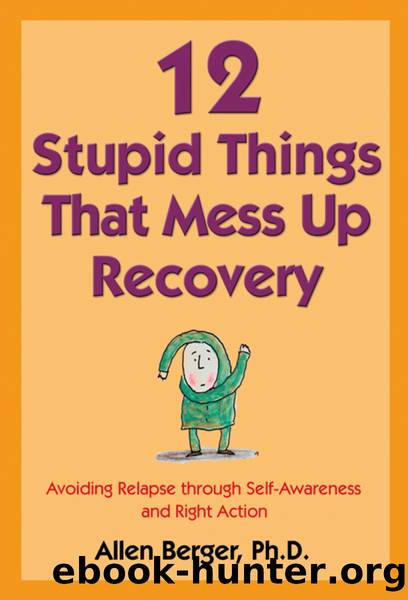12 Stupid Things That Mess Up Recovery by Allen Berger

Author:Allen Berger
Language: eng
Format: epub
Publisher: Hazelden Publishing
Published: 2008-07-14T16:00:00+00:00
Recovery requires honesty. Playing games with ourselves is dishonest and doesn’t address our problems. It is instead a sophisticated strategy to avoid dealing with our problems. Avoidance is ultimately destructive to the process of recovery.
One of the most important skills in recovery is self-honesty. It is stated on page 58 of the Big Book that even those “who suffer from grave emotional and mental disorders . . . recover if they have the capacity to be honest.” It is common knowledge that if we have the capacity to be introspective, without avoiding those things about ourselves that we do not like and that we do not want to see, then we have a good chance of developing a solid program of recovery. Most of us who are now trudging the road of recovery have made a career out of self-deception. We have not been honest with ourselves and others because it has been too painful. We have run from the truth, distorted the truth, and twisted reality over and over again. We have mastered the art of self-deception.
Recovery is the antithesis of addiction. If addiction is characterized by deceit and self-deception, then recovery is characterized by openness and honesty. In recovery, we shift our behavior 180 degrees. We do the opposite of what we used to do. Keep this in mind for the remainder of this chapter. Be open-minded and keep an open heart. Fight the temptation to run away. There may be some things I discuss that may be difficult to face. Remember, in honesty there is freedom. So here we go!
I am convinced if we are honest with ourselves—really honest with ourselves—we will see that we play games. I do, and you do too. We all have a racket. We play games with ourselves and with others. We may not realize it, but these games keep us stuck. They keep us emotionally immature and emotionally dependent on others. Typically the games we play are designed to manipulate others for emotional support, indirectly extract approval from others, or inflate our self-esteem at their expense. Here are a few of the more common games that people play:
• Helpless Harry. Helpless Harry comes across as incapable of thinking for himself. He is a follower and doesn’t know what to do without getting advice or approval for his decisions. Harry doubts everything he does. He fools himself and others into thinking he is incompetent and incapable of coping with life. His pseudo-helplessness is a ruse designed to get other people to think for him and tell him what to do. Harry doesn’t want to make his own decisions because he might be wrong. Harry doesn’t want to take a risk, so he plays it safe and gets other people to think for him. Because Harry is a master at this game, he successfully gets well-intentioned therapists and friends to take responsibility for his decisions. Unfortunately, Harry never grows up. He sabotages his emotional and spiritual development through manipulating others to make his decisions and provide him with emotional support for his actions.
Download
This site does not store any files on its server. We only index and link to content provided by other sites. Please contact the content providers to delete copyright contents if any and email us, we'll remove relevant links or contents immediately.
| Adult Children of Alcoholics | Alcoholism |
| Drug Dependency | Gambling |
| Hoarding | Obsessive Compulsive Disorder (OCD) |
| Sexual | Smoking |
| Substance Abuse | Twelve-Step Programs |
The Hacking of the American Mind by Robert H. Lustig(3580)
Right Here, Right Now by Georgia Beers(3497)
Fingerprints of the Gods by Graham Hancock(3213)
Goodbye Paradise(2964)
Bad Pharma by Ben Goldacre(2730)
Happiness by Matthieu Ricard(2524)
More Language of Letting Go: 366 New Daily Meditations by Melody Beattie(2444)
The Social Psychology of Inequality by Unknown(2311)
Drugs Unlimited by Mike Power(2192)
The Plant Paradox by Dr. Steven R. Gundry M.D(2040)
Confessions of a Shopaholic by Sophie Kinsella(1865)
Borders by unknow(1785)
Make Love Not Porn by Cindy Gallop(1751)
Dry by Augusten Burroughs(1688)
Stop Being Mean to Yourself: A Story About Finding the True Meaning of Self-Love by Melody Beattie(1656)
Getting Off by Erica Garza(1619)
Yoga and the Twelve-Step Path by Kyczy Hawk(1533)
Weed, Inc. by Ben Cort(1512)
Unmasking Male Depression by Archibald D. Hart(1507)
